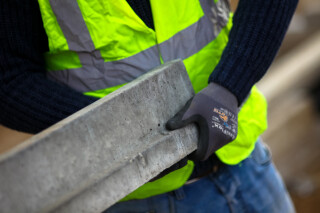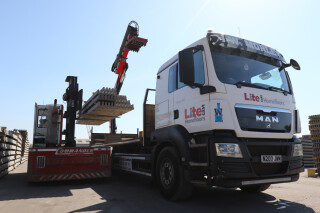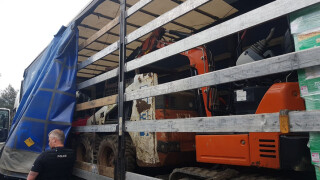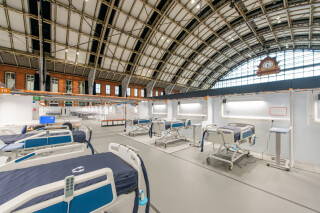In January, when we marvelled at the ability of Chinese contractors to build two 1,000-bed hospitals in just eight days to treat Covid-19 patients in Wuhan, few imagined that British construction companies would be delivering half a dozen similarly-sized field hospitals in the UK just a few weeks later.
The first so-called NHS Nightingale hospital, located in the ExCel conference centre in east London, was built in just nine days by a team including Mace as project manager, architect BDP and London-based healthcare specialist CFES as principal contractor.
With beds for 4,000 patients, the London Nightingale hospital was the biggest as well as the first to be built.
Four more followed in quick succession: in Manchester, Bristol, Harrogate and Birmingham. Other emergency hospitals were also set up in Glasgow, Cardiff and Belfast, with plans for additional field hospitals in Carlisle, Exeter and Sunderland.
This article was first published in the June 2020 issue of The Construction Index Magazine. Sign up online.
The Harrogate Convention Centre – now the Harrogate Nightingale Hospital – was delivered by a team led by BAM Construction as main design and build contractor under the government’s ProCure 22 framework for England.
BAM Design was appointed to deliver structural engineering, with Silcock Leedham providing services engineering and Arcadis as quantity surveyor and project manager. BDP was, again, the lead architect.
BAM and its team converted eight exhibition halls, installing suitable partitioning, flooring, and the specialist mechanical and electrical installations required for medical use.
Work began in the second week of April and the facility was completed ready for its official opening on 21stApril.
The second Nightingale hospital to be delivered was the NHS Nightingale Hospital Birmingham, located at the National Exhibition Centre.
This 1,000-bed facility was built by a team led by Interserve and was handed over on 16th April.
More than 400 site staff and 60 Gurkhas from the British Army worked more than 86,000 construction hours on the project.
Manchester’s Nightingale hospital was delivered by Integrated Health Projects (IHP), a joint venture between Vinci Construction UK and Sir Robert McAlpine, also under the ProCure 22 framework.
Located at the Manchester Central Convention Complex, the NHS Nightingale Hospital North West was built in two weeks and opened on 17th April.
Other team members included Mott MacDonald, BDP and NG Bailey in collaboration with NHS clinicians and with the support of army specialists.
IHP hailed the project as “an excellent example of collaboration across all construction disciplines, local government, the military and the NHS”.
Within 12 hours of getting the green light, IHP was up and running and the facility was handed over 13 days after construction began. Professor Michael McCourt, the new hospital’s chief executive, said: “It has been incredibly humbling to see all the hard work that has gone into building a hospital out of nothing and in such a short period of time.
Teams have worked day and night, in a challenging environment to achieve this.”
That the hospitals have since proved largely surplus to requirements should not detract from this achievement.
At the beginning of May, the government announced that the flagship hospital, at London’s ExCel centre, would close on the 15th of the month. At the time of the announcement, the facility had just 12 patients and had treated fewer than 60.
The four other Nightingale hospitals were also earmarked for closure, only one of them (Manchester) having treated any patients. But although now closed, there is no plan to re-convert the buildings to their original functions – at least, not yet. The hospitals are merely mothballed, ready to be pressed into service should there be a second wave of Covid-19 infections.
It’s an ill wind…
Despite the harm done to many businesses, most are likely to survive the lockdown. Some even think the crisis has made them stronger – here are two of them
For most businesses, the Covid-19 lockdown has been a huge challenge. With trade grinding to a halt, revenues stifled and forward planning almost impossible, the crisis has dealt a body-blow from which many businesses will not recover. But not all companies have suffered – some, indeed, have used the enforced suspension of normal activities to focus on new opportunities.
While many companies in the construction sector furloughed staff and operated at reduced capacity, one London-based supplier of cladding products was enjoying one of its best-ever trading periods.

Pura Facades, part of the Vivalda Group of companies, says that year-to-date sales have nearly doubled, compared to the same period last year, and it has secured £1.7m of business since lockdown began at the end of March. For a company whose most recent accounts show annual turnover of less than £4m (for 2018), this is quite a haul.
Pura expects that it will increase its annual revenues to approximately £7.5m in 2020.
Pura supplies cladding products made of lightweight glass-reinforced concrete (GRC), terracotta and stone.
New projects secured in the past few months include the recladding of Fulham Football Club’s Craven Cottage stadium, Birmingham’s Symphony Hall, Berkeley Group’s Clarendon Works in Wood Green, Ark Soane Academy in Acton, Stephenson House mixed-use development in London and work for the University of Strathclyde.
Commercial director James Butler said: “In many ways, this lockdown period enabled us to focus on getting designs done and estimating completed. Unhindered by on-site operational issues, specifiers were able to focus their attention on pipeline projects – which have now come to fruition.
“In truth, this rise in orders is really down to the hard work of our team over the last few months and years, forging strong relationships with architects, designers and contractors – demonstrating the A1 safety credentials and competitive price of Pura’s lightweight GRC offer.
“During the post-Grenfell era, developers are keen to explore materials that provide first-class non-flammable and aesthetic properties, while delivering on disciplined budgets. They are also looking for cladding partners who offer a complete service including design, engineering, on-site support and the full sub-grid to support the GRC panels themselves.”
For other companies, having desk-based staff obliged to work from home has exposed the potential for efficiency improvements. Time normally spent commuting to the office is won back (either to extend working hours or for the benefit of the employee’s home life) and meetings via apps such as Zoom or Microsoft Teams are often shorter and more productive than face-to-face.
Jonny Leroux, managing director of Litecast, a Nuneaton-based supplier of beam and block flooring, says that going digital has saved his business.
.png)
Litecast makes more than 42,000m of concrete beams a week. “Five years ago, before we digitised and went paperless, we wouldn’t have been able to carry on trading [through the coronavirus lockdown], says Leroux.
“We appear to have very much bucked the trend by a combination of heavy investment in a bespoke ERP system, rapid deployment of a working-from- home policy and the commitment of a small core of hard working and dedicated skeleton staff,” he says.

“Essentially, the fact that we are now paperless allowed us to roll out remote working within hours of the lockdown announcement – meaning that the office continued to work exactly as before. The speed with which we can turn around a design and a quote meant we were able to reposition the business during the lockdown to service the builders’ merchants/retail markets – and the number of patios, domestic extensions and self-builds we’ve supplied in the last two months is higher than the previous two years combined.
“The fact that production planning is done at the click of a button (by one of the production operatives, not a member of the office staff) also meant that social distancing protocol could easily be following as zero interaction was required with the office/admin staff.
“We’ve almost entirely changed our business model in the last two months, from selling 90% of our product into building sites to selling 70% into the retail/builders’ merchants for self-builds and domestic extensions. This has only been made possible because of our comprehensive bespoke system, Elsie.”
Leroux explains that Elsie is a software package that he commissioned on taking over the business in 2015. It was developed by Milton Keynes-based software developer Techtoniq specifically for Litecast.
He says that it was a heavy investment for a £15m-turnover business but as “a ground-up business-wide technology system” it has had a transformational effect on business processes.
Excel worksheets and AutoCAD technologies have been replaced by integrated web-based applications with the incorporation of Revit software. All information is available to management at the click of a button anywhere in the world. Key performance indicators are updated in real time and accessible by employees through office dashboards.

Thanks to Elsie, changes to processes include the production of beam layout designs with quotations, 96% of which are turned around and delivered within 48 hours. Before 2015, quotes were estimates, and designs were only produced on receipt of order.
Previously, one person spent four hours a day calculating and planning the daily casting requirements; it is now done at the click of a button.
Similarly, all invoicing, billing and accounting functions are automated.
Customers can place orders and make payments for quotations online, without the need to even contact the company or for employees to process emails or take phone calls.
Leroux says that Elsie also has an employee portal, which covers all training and HR functions of the business, resulting in there being no need for a dedicated HR manager despite the company having doubled the number of employees since 2015. ISO documentation has taken on a new form via Elsie, accessible to all that need it, navigated without the need for spreadsheets and physical folders containing the required documentation.
Plant thieves prosper under lockdown
Construction plant theft soared by an estimated 50% as Covid-19 forced sites to close
The temporary shut-down of construction sites across the country at the end of March led to a dramatic upturn in the number of plant thefts.
Contractor Clancy Docwra reported a 50% spike in thefts of tools and construction machinery from its sites while other sources suggest that such incidents more or less doubled in the first few weeks of the lockdown.

“The coronavirus lockdown has meant that it’s currently open season for criminal gangs who target construction plant” said Nick Mayell, CESAR police training and liaison officer with technology firm Datatag.
“The abrupt abandonment of work-sites has left machinery unsecured and vulnerable. Whereas a company would normally wind-down for seasonal closures by off-hiring kit and moving their own machines, sites have closed overnight and the thieves are having a field day.”
CESAR is the Construction and Agricultural Equipment Security and Registration scheme, owned by the Construction Equipment Association (CEA). Datag supplies the forensic tagging technology that maintains proof of ownership and keeps track of machines’ locations.
Mayell added: “The shifting of kit has also become much easier as trucks and vans are moving freely during the lockdown where car travel is restricted to ‘essential’.”
Ian Elliott, group head of security at Clancy Docwra, is vice chairman of Combined Industries Theft Solutions (CITS). He advised: “Firms should be aiming at removing the majority of tools and plant away from site compounds. Where traditionally companies would perhaps have used plant containers, during these challenging times companies are advised to leave these almost empty and remove plant and tools to a head-office, where possible, or place the tools and small kit within brick or concrete buildings well out of sight of the criminals.”
Another provider of security systems, Crewe-based Radius Telematics, has also reported a big increase in the theft of commercial vehicles and plant since the lockdown.
Last year Radius, which is better known for its fuel cards and payment solutions, acquired two tracking and security firms, Plant-i and US-based Cyntrx. Both firms have reported significant spikes in thefts.
Altogether, Radius Group companies track over 250,000 vehicles worldwide, with security devices fitted to over 27,000 assets ranging from generators to vans, mini-diggers and earth moving trucks.
“From security tracker alerts we have seen a doubling in plant and van theft since the lockdown began,” said Radius MD Greville Coe. “It’s incredible that when we are all self-isolating and worrying about a deadly virus, crime is being committed while people and organisations are so vulnerable.”
One particularly disturbing theft was of a van stolen from a hospice for the terminally ill. The incident in Coventry on 29th March saw a property belonging to The Myton Hospices ransacked and the theft of their Ford Transit van.
Because the vehicle was fitted with a Sure-Track tracker donated by Radius Telematics, it was safely recovered after three days.
The Covid-19 virus has not only led to an increase in plant theft but has also added further delay to the launch of a new Agricultural Construction Equipment national police unit to coordinate the fight against plant theft. This is intended to take over the work of the old Plant & Agricultural National Intelligence Unit (PANIU), which closed last year when the Metropolitan Police Service pulled the plug on it.
It had been hoped that the new unit would be launched on 1st April 2020, but this has now been postponed until 1st October 2020.
CEA chief executive Rob Oliver said: “The good thing is that although the new national police unit is delayed, there is still active industry/police cooperation going on. This is made possible by the expertise of the CESAR Police Liaison Team, CITS and others stepping up their services to combat this crime wave. Police officers may have other urgent concerns at present, but the 24/7 CESAR call centre remains as a quick check resource for them when they need to identify suspicious plant. At the moment, it is all about working together to help protect our people and our businesses.”
This article was first published in the June 2020 issue of The Construction Index Magazine
UK readers can have their own copy of the magazine, in real paper, posted through their letterbox each month by taking out an annual subscription. Click for details.
Got a story? Email news@theconstructionindex.co.uk




